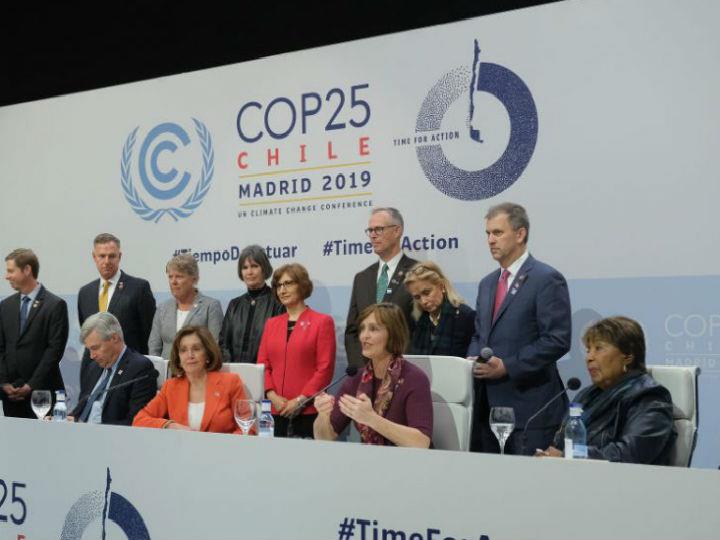by Pol Bargues-Pedreny*
This blog is part of EU-LISTCO, an innovative and timely project that investigates the challenges facing Europe’s foreign policy. A consortium of fourteen leading research institutions and universities aims to identify risks connected to areas of limited statehood and contested orders—and the EU’s ability to respond.
The UN Climate Change Conference (COP25) organized in Madrid on December 2–15, 2019, ended in failure.
There was no agreement to set a rulebook for the Paris Agreement and design a global carbon market.
Big polluters such as Australia, Brazil, China, India, and the United States halted progress on the so-called loss and damage mechanisms to assist developing countries vulnerable to the adverse effects of climate change.
Any major deals were postponed.
The UN secretary general, Antonio Guterres, voiced his discontent: “I am disappointed with the results of COP25. The international community lost an important opportunity to show increased ambition on mitigation, adaptation, and finance to tackle the climate crisis.”
From the Chilean conference president to countries’ delegates and concerned scientists, everyone was dissatisfied with the delivery of the climate negotiations. The COP25 was full of empty messages. Hot air.
Reading the press the day after was even more upsetting. The Guardian argued that the conference achieved few concrete plans: “A conference marked by squabbling and deferral yielded little progress despite protests.”
The New York Times spoke of “few commitments” and a “lost opportunity” because the United States may officially withdraw from the Paris Agreement on climate change in 2020.
Le Monde’s editorial headline was “A climate summit to forget,” one that nourished democratic disenchantment. In general, the press, as well as Instagram and Twitter influencers, were frustrated by the yawning gap between words and deeds, between ambitious ideals and the crude reality.
Inside the IFEMA pavilion where the COP25 took place, however, the mood was very different—at least until the closing day. “Action, action, action” was one of the slogans. Two others were “time for action” and “raising ambition, empowering action.”
Each state presented its most exciting initiatives and proved that it was determined to act.
Japan, for example, exhibited a project to decarbonize isolated islands by utilizing rainwater and floating offshore wind turbines that might even survive earthquakes and tsunamis.
Colombia showed a project supported by the UN Development Programme and others to reduce the vulnerabilities of the communities living in the country’s northern Momposina region, where vast wetlands are affected by avalanches, continued floods, extreme droughts, and other hydrometeorogical hazards. The outcome is meant to strengthen the capacity of rural populations by promoting water management and climate-adapted production practices and renovating early-warning systems for climate resilience.
Next to the plethora of individual states’ projects were the stalls hosted by international organizations. If states together with private companies and other partners are the executors of policies, international organizations are the catalysts.
The NDC Partnership, for example, provides financial and technical assistance to other countries to help them meet their national climate commitments.
Similarly, the EU REDD Facility helps developing countries reduce greenhouse gas emissions from their forest and land-use sectors.
To be clear, the general mood at the COP25 should not be confused with optimism and naive confidence in science and technology aimed at preventing doomsday scenarios. The conference did not see any eco-modernism—the blind faith in humans having godlike capacities to save the planetary crisis.
On the contrary, everyone at COP25 criticised top-down models of ecosystem control. Everyone admitted the limits of human knowledge, agonized with the consequences of urbanization, agriculture, and industrial waste. Scientists confirmed the only certainty: human activities impact the earth’s systems, causing ecological crises—as concluded in the presentation of the Intergovernmental Panel on Climate Change’s special report on climate change and land.
Against the background of this diagnosis, participants stressed the need for flexible and viable “nature-based solutions”—hoping that nature can provide “sustainable, cost-effective, multipurpose, and flexible alternatives for various objectives.” Initiatives, experiments, and commitments to action were everywhere.
But it was action without clear objectives, without concrete outcomes, so-called whatever action. It is hope rather than optimism that ruled the venue. Hope that the next initiative will succeed. And hope is always deceptive.
Precisely because everyone had great expectations, the climate summit blended in with disappointment. Weirdly, hope and despair married those inside and outside the COP25.
For most policymakers and experts that took part in the conference, the outcomes of the summit appeared insufficient; greater funds, commitment, and initiatives were needed.
For the protesters and critics following and commenting on the summit from outside, even greater ambition, greater commitment, more action is essential. Here, today, and now.
Policymakers seemed to expect that the next experiment to mitigate climate emergencies will be successful, that initiatives will bring new results and open new opportunities.
Critics pressed governments to work harder. Everyone wishes that ambition and expectations be raised. Everyone hopes that the COP26 in Glasgow in 2020 will be the decisive one.
*researcher at the Barcelona Centre for International Affairs
**first published in: carnegieeurope.eu




 By: N. Peter Kramer
By: N. Peter Kramer
